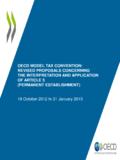Transcription of Draft General Scheme of Mediation Bill 2012
1 1 Draft General Scheme of Mediation bill 2012 Arrangement of sections Head 1. Short title and commencement 2. interpretation 3. Scope and application 4. Duty on solicitor to provide information and advice on Mediation 5. Duty of barrister in relation to Mediation 6. Mediation conditions 7. Role of mediator 8. Duty on mediator to provide information on training etc. 9. Codes of practice 10. Confidentiality of Mediation communications 11. Enforceability of Mediation agreements 12.
2 Court support for Mediation alternative 13. Submission of mediator s report to court 14. Effect of Mediation on limitation and prescription periods 15. Staying of court proceedings arising from Mediation clause 16. Fees and costs 17. Factors to be considered in awarding costs 18. Involvement of child or dependents in family law Mediation 19. Liability for civil damages 20. Amendment of Civil Liability and Courts Act 2004 2 Head 1 Short title and commencement Provide that: 1. (1) This Act may be cited as the Mediation Act 2012.
3 (2) This Act comes into operation on such day or days as the Minister may appoint by order or orders either generally or with reference to any particular purpose or provision, and different days may be so appointed for different purposes or provisions. Explanatory note This is a standard provision. 3 Head 2 interpretation Provide that: 2. In this Act civil proceedings include commercial proceedings, proceedings in relation to boundary disputes between adjoining landowners and proceedings before a tribunal other than a Tribunal of Enquiry.
4 ; commercial proceedings include a claim under section 205 of the Companies Act 1963; dispute subject to Head 3, means any civil or commercial dispute that could give rise or has given rise to civil proceedings; family law dispute means a dispute that could give rise to family law proceedings in court; mediator means a person who assists parties to reach a voluntary agreement to resolve their dispute whilst acting at all times in accordance with the principles of impartiality, integrity, fairness and confidentiality, with respect for all parties involved in the Mediation .
5 Mediation means a facilitative and confidential process in which a mediator assists parties to a dispute to attempt by themselves, on a voluntary basis, to reach a mutually acceptable and voluntary agreement to resolve their dispute.;1 Mediation communications include 1 A number of alternative definitions for Mediation are available including: 1. EU Mediation Directive - DIRECTIVE 2008/52/EC Mediation means a structured process, however named or referred to, whereby two or more parties to a dispute attempt by themselves, on a voluntary basis, to reach an agreement on the settlement of their dispute with the assistance of a mediator.
6 2. Folberg and Taylor - Mediation : A Comprehensive Guide to Resolving Conflict without Litigation Mediation means a process by which the participants, together with the assistance of a neutral third person or persons, systematically isolate disputed issues in order to develop options, consider alternatives, and reach a consensual settlement that will accommodate their needs.) 4 (a) statements that are made orally or in writing or other recorded activity by a mediator, party or non-party participant, and (b) communications to initiate a Mediation process and other communications arising out of or in connection with a Mediation process; Minister means the Minister for Justice and Equality; non-party participant means a person, other then a party or mediator, who participates in a Mediation .
7 Party includes an individual and a legal person and, without prejudice to the generality of that definition, includes the State, a Government Department, a local authority, any other body established by or under an enactment (including a company), and an unincorporated body (including a partnership or club). Explanatory note civil proceedings : while the term civil proceedings is normally understood in this jurisdiction to include proceedings relating to commercial disputes, EU instruments such as the Mediation Directive refer to Mediation in civil and commercial matters ; Statutory Instrument 209 of 2011 which transposes the Directive also makes reference to civil or commercial proceedings.
8 The definition makes specific reference to boundary disputes between adjoining landowners, a frequent source of potential litigation and to proceedings before any tribunal which is not a Tribunal of Enquiry. commercial proceedings : as recommended by the LRC, commercial proceedings has been defined to include reference to shareholder disputes (minority shareholder oppression under the Companies Act 1963). dispute : the definition of dispute is intended to implement the recommendation in paragraph of the LRC Report, which is based on the General definition of civil and commercial matters in the 2000 EU Brussels I Regulation on jurisdiction and the recognition and enforcement of judgments in civil and commercial matters, and (in respect of mandatory statutory requirements) the text in the European Communities (Unfair Terms in Consumer Contracts) Regulations 1995 (SI of 1995).
9 The definition is subject to the provisions of Head 3 which implements the recommendation in the LRC Report that the definition of dispute be subject to a number of exclusions: firstly, where employment disputes are being dealt with through the alternative dispute processes of the Labour Relations Commission or the Labour Court; secondly, the bill is not intended to replace any Mediation or other dispute-resolution process which is already provided for under any other enactment; thirdly, in relation to tax or customs matters.
10 In addition, Mediation cannot be used to avoid any mandatory 5 constitutional or statutory requirements. These three exceptions have been grouped at Head 3. family law proceedings : The LRC bill included a definition of family law proceedings that made reference to the definition included in the Draft Courts (Consolidation and Reform) bill 2010 contained in the Commission s Report on Consolidation and Reform of the Courts Acts (LRC 97-2010). This definition has not been retained in the General Scheme ; the reference to family law proceedings will have its ordinary, and well-understood, meaning.











